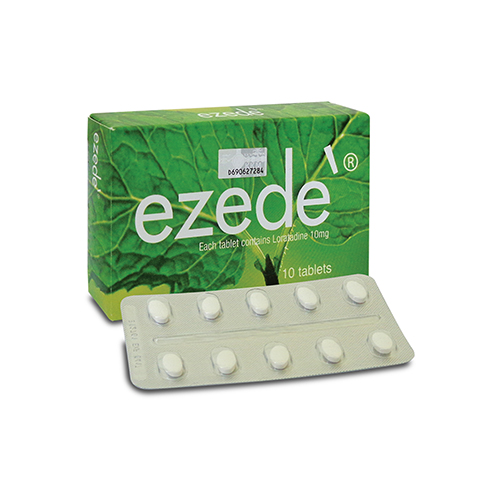
EZEDE Tablet
Therapeutic Class
Antihistamines & Antiallergics
Indications
Ezede Tablet is indicated for the relief of symptoms associated with allergic rhinitis, including sneezing, nasal discharge and itching, as well as ocular itching. It is also indicated for the relief of symptoms associated with chronic urticaria and other allergic dermatologic disorders.
Chemical Composition
Each tablet contains Loratadine 10 mg.
Packaging
1 x 10's / Box
Dosage & Administration
Adults and children 12 years old and over: One ezede Tablet (10 mg) once daily. Children 6 to 12 years old: Body weight > 30 kg - One tablet (10 mg) once daily. Body weight < 30 kg - Half a tablet (5 mg) once daily.
Contraindications
Ezede Tablet is contraindicated in patients who are hypersensitive to this medication or any of its ingredients.
Warning & Precautions
Patients with liver impairment or renal insufficiency (GFR < 30 mL/min) should be given a lower initial dose because they have reduced clearance of loratadine. An initial dose of 5 mg once daily or 10 mg every other day is recommended.
Side Effects
Most common side effects associated with loratadine include headache, fatigue and somnolence, dry mouth, gastrointestinal disorders such as nausea, gastritis, and allergic symptoms like rash. There are no problems with sedation or antimuscarinic activity in usual doses. Alopecia, anaphylaxis and abnormal hepatic function have been reported rarely.
Drug Interaction
Increased plasma concentrations of loratadine and/or descarboethoxyloratadine were reported when administered concomitantly with erythromycin, cimetidine and ketoconazole, but without clinically significant changes in the safety profile of loratadine, as assessed by electrocardiographic parameters, clinical laboratory tests, vital signs and adverse events. When administered concomitantly with alcohol, loratadine has no potentiating effects as measured by psychomotor performance studies. Co-administration with drugs that inhibit or are metabolized by hepatic cytochrome P450 3A4 or 2D6 may elevate plasma concentrations of either drug and adverse reaction might result.

